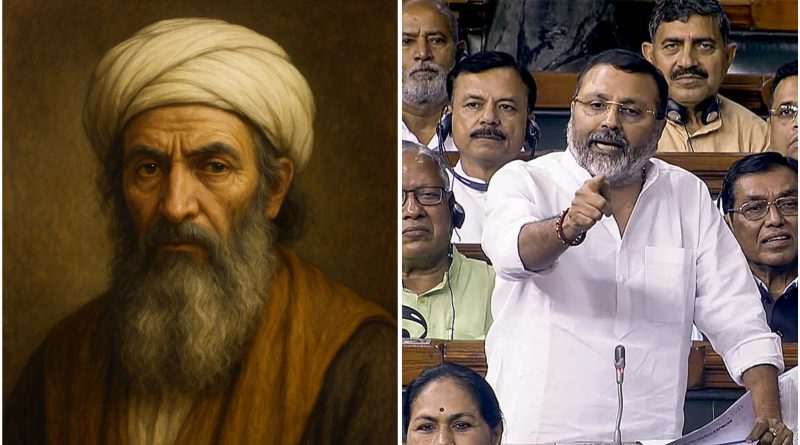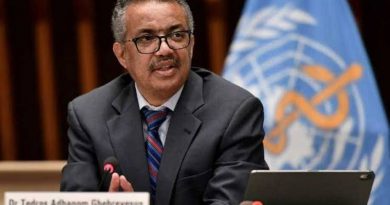Prophet’s Jewish Ally Rabbi Mukhayriq—Why BJP Lawmaker Quoted Him in India’s Parliament?
Prophet Mohammad honored him by saying, “He was the best of the Jews”, recognizing his noble spirit and contribution to the broader cause.
On April 2, 2025, during a intense parliamentary debate over the Waqf Amendment Bill, India’s ruling party’s lawmaker Nishikant Dubey made a striking reference that caught the attention of both historians and common citizens alike. While defending the bill, which proposes to bring structural reforms and inclusivity to the administration of waqf properties, Dubey cited the example of a 7th-century Jewish scholar and leader—Rabbi Mukhayriq.
His words triggered a wave of curiosity about a figure not often mentioned in popular discourse—especially within Indian political conversations. Who was this Rabbi, and why is he relevant in today’s debate on religious property and national interest?
Who Was Rabbi Mukhayriq?
Rabbi Mukhayriq was a prominent Jewish scholar and wealthy landowner from the Banu Tha’labah tribe of Medina. He lived during the time of Prophet Mohammad and is remembered in Islamic and Jewish historical traditions for his courageous and selfless actions during the Battle of Uhud in 625 CE.
On the day of the battle, the city of Medina faced an imminent threat from the Quraysh tribe of Mecca. As fate would have it, the day fell on the Sabbath—a holy day for Jews, on which work and combat are generally forbidden. Despite this religious restriction, Rabbi Mukhayriq gathered his people and urged them to fight alongside the Muslims to defend their shared homeland. When his fellow tribesmen hesitated due to Sabbath laws, he rebuked them and reportedly said, “You have no Sabbath”, stressing that the defense Medina was a higher moral responsibility.
Rabbi Mukhayriq went to the battlefield and fought alongside the Muslim army. He died in the battle, becoming one of the few Jewish martyrs in the defense of Medina. He was buried in the ‘Shoda-e-Uhud’ graveyard alongside Prophet’s uncle Hamza Bin Abdul-Mutallib.
Before leaving, he had instructed that all his wealth—including several orchards—be handed over to Prophet Mohammad. The Prophet accepted this and used the wealth to establish one of Islam’s first waqf (charitable endowments), which was used to serve the poor and support the growing Muslim community.
Prophet Mohammad honored him by saying, “He was the best of the Jews”, recognizing his noble spirit and contribution to the broader cause.
A Lesson in Interfaith Unity
What makes Rabbi Mukhayriq’s story timeless is not just his bravery, but the message it carries about interfaith cooperation. At a time when divisions between communities often lead to conflict, Mukhayriq’s sacrifice reminds us that people of different faiths can—and have—worked together for the common good—to defend the national cause.
The Battle of Uhud wasn’t just a military confrontation—it was a moment that tested the moral fabric of Medina’s diverse society. The actions of Rabbi Mukhayriq exemplify that protecting a shared homeland and values sometimes means putting community above personal interests—even above religious norms.
It also highlights how early Muslims and Jews, despite theological differences, stood together when it mattered most.
Relevance in Modern India
MP Nishikant Dubey’s invocation of Mukhayriq during the Waqf Amendment Bill debate wasn’t accidental. The bill proposes to broaden waqf board membership to include non-Muslim experts and aims to improve transparency and governance in the management of waqf properties—assets donated for religious or charitable purposes under Islamic law.
Supporters of the bill argue that involving non-Muslims, especially legal and financial professionals, can improve efficiency and reduce corruption. Critics, however, view it as state interference in religious affairs. India’s Home Minister Amit Shah stated that, non-Muslims shall not interfere into religious affairs come what may.
Dubey’s reference to Mukhayriq was used to draw a powerful parallel—that the spirit of community service and unity across faith lines is not alien to Islamic tradition. He framed the reforms not as interference, but as an invitation to all Indians, regardless of religion, to participate in nation-building and the transparent management of shared resources.
A Legacy Worth Remembering
Rabbi Mukhayriq’s legacy is more than a footnote in Islamic history—it is a shining example of moral courage, selflessness, and the power of interfaith unity. In times where communal tensions are often stoked for political gain, his story serves as a reminder that the higher cause of justice, harmony, and national interest can—and should—transcend religious boundaries.



